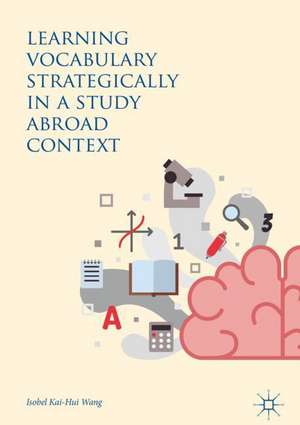Learning Vocabulary Strategically in a Study Abroad Context
Autor Isobel Kai-Hui Wangen Limba Engleză Hardback – 4 dec 2017
| Toate formatele și edițiile | Preț | Express |
|---|---|---|
| Paperback (1) | 581.78 lei 38-44 zile | |
| Springer International Publishing – 5 sep 2018 | 581.78 lei 38-44 zile | |
| Hardback (1) | 648.56 lei 6-8 săpt. | |
| Springer International Publishing – 4 dec 2017 | 648.56 lei 6-8 săpt. |
Preț: 648.56 lei
Preț vechi: 763.01 lei
-15% Nou
Puncte Express: 973
Preț estimativ în valută:
124.14€ • 134.89$ • 104.35£
124.14€ • 134.89$ • 104.35£
Carte tipărită la comandă
Livrare economică 21 aprilie-05 mai
Preluare comenzi: 021 569.72.76
Specificații
ISBN-13: 9783319659626
ISBN-10: 3319659626
Pagini: 294
Ilustrații: IX, 294 p. 10 illus., 9 illus. in color.
Dimensiuni: 148 x 210 mm
Greutate: 0.64 kg
Ediția:1st ed. 2018
Editura: Springer International Publishing
Colecția Palgrave Macmillan
Locul publicării:Cham, Switzerland
ISBN-10: 3319659626
Pagini: 294
Ilustrații: IX, 294 p. 10 illus., 9 illus. in color.
Dimensiuni: 148 x 210 mm
Greutate: 0.64 kg
Ediția:1st ed. 2018
Editura: Springer International Publishing
Colecția Palgrave Macmillan
Locul publicării:Cham, Switzerland
Cuprins
Chapter 1. Introduction.- Chapter 2. The Ryder Site.- Chapter 3. The Wolfson Site.- Chapter 4. The Opal Site.- Chapter 5. Strategic Vocabulary Learning as a Complex Dynamic System.- Chapter 6. Learning Vocabulary Strategically in a Study Abroad Context.
Notă biografică
Isobel Kai-Hui Wang is Lecturer in Applied Linguistics at the Department of English, Nankai University, China. Her research interests lie in the area of vocabulary learner strategies, second language vocabulary acquisition, and intercultural communication.
Caracteristici
Reveals the complexity of strategic vocabulary learning experiences of Chinese students as they study for their degrees in English-speaking countries Offers an in-depth account of how and why learners select and combine certain strategies to enhance their vocabulary learning Explores the complex interplay between the students' strategy use, their agency as a learner and their discrete learning contexts
